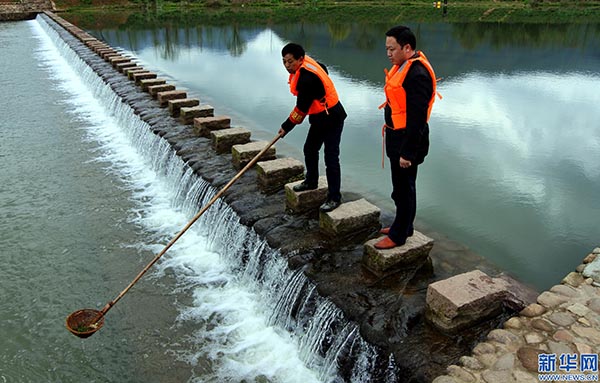2 new environmental laws to go into effect in 2018
- By Zhang Jiaqi
 0 Comment(s)
0 Comment(s) Print
Print E-mail China.org.cn, January 1, 2018
E-mail China.org.cn, January 1, 2018

China will enact two new environmental protection laws at the start of 2018 -- one to formalize the emissions discharge fee into a tax collected from industrial polluters, and the other to combat water pollution more effectively.
According to the Environmental Protection Tax Law of China -- which goes into effect on Jan. 1 -- air pollution, water pollution, solid wastes and noise are the four major categories of taxable emissions. While the levied items are to remain the same as the previous fee system, the law designates the local tax bureaus as collators of the new environmental protection tax.
Furthermore, local government will decide on the tax rate for the levied items within a range specified by the central government. However, the entire amount of the tax collected will now become part of the local tax revenue, whereas 10 percent of the defunct emissions discharge fee used to go to the central government.
The law was passed during the 25th session of the 12th National People's Congress in December 2016. It will become the first tax law enacted since the third plenary session of the 18th CPC central committee. As a major act to promote the construction of ecological civilization through taxation, the introduction of the environmental protection tax aims to further improve China's "green taxation" system and contribute to the country's environmental protection.
As implementation draws near, the preparation for the collection and management of new tax is underway. Local governments in Beijing and provinces such as Hebei and Shandong have made announcements on their respective local tax rates for air and water pollutants. Beijing has applied the highest tax rate on emissions.
Also on Jan. 1, China will enact the newly revised Water Pollution Prevention and Control Law, which includes expanding on a successful regional pilot of the river chief system to cover the whole country. Under this system, leading officials at various government levels will assume responsibility for addressing water pollution, including resource protection, waterline management, pollution prevention and control, and ecological restoration.
The system first successfully piloted in Wuxi, Jiangsu Province ten years ago to address the water pollution in Taihu Lake caused by algae, and has been rolling out in recent years across the country as part of a broader effort to combat water pollution.
Tong Weidong, an official of the Commission of Legislative Affairs of the Standing Committee of China's National People's Congress, explained the system as such: Under the innovative system, the CPC and government officials are expected to pool efforts together, which in the past fall within the remit of various agencies and departments. Besides, the leading officials will be accountable for enhancing water environment as the river chiefs, and the outcomes will affect the evaluation of their personal performances.
The law also adds stipulations in rural areas, where water pollution is severe but lacks effective treatment. The law states, among other things, that the country supports the construction of sewage and waste treatment facilities in the rural area, and that the standards in producing fertilizers and pesticides should comply with the requirement of protecting the water environment.
In addition, the revised law increases the penalties for breaking the law. For example, illegal discharging of pollutants by companies can be subject to a maximum fine of 1 million yuan (about US$150,000) under the newly revised law. Environmental authorities expect the river chief system and the heavy penalties will effectively enhance China's water environmental management system and the national water security.
The new laws are coming on the heels of similarly strict legal measures that have effectively curbed air pollution in previously heavily polluted areas such as Beijing and Hebei Province. Lawmakers are expecting the new measures to help carry forward China's achievement and momentum in environmental protection in recent years.






Go to Forum >>0 Comment(s)